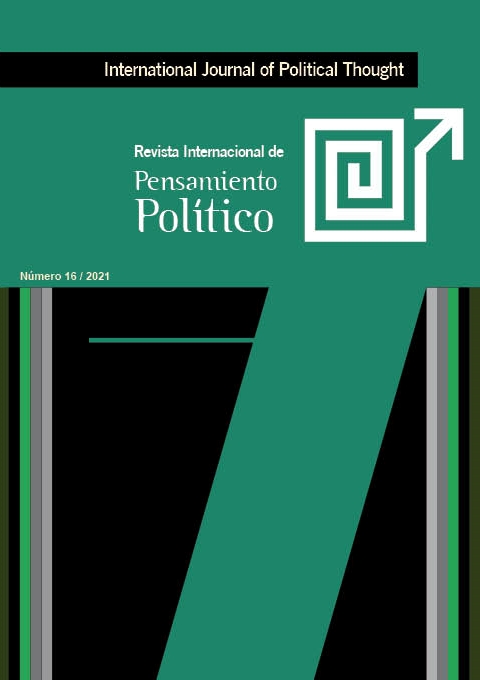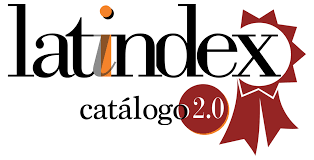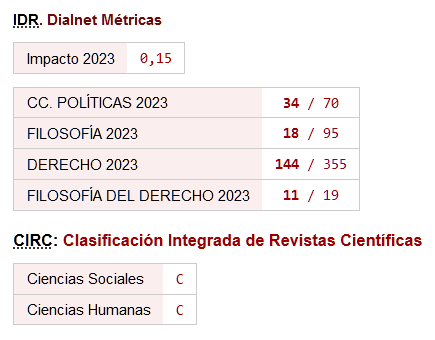Republicanismo: una actualización como teoría de los Estados libres
DOI:
https://doi.org/10.46661/revintpensampolit.6276Palabras clave:
Independencia, libertad, neorrepublicanismo, dominación, dependenciaResumen
El neorrepublicanismo de Quentin Skinner, Philip Pettit y Maurizio Viroli tiene el mérito de haber recuperado la idea republicana de libertad para abordar críticamente las distintas formas de dominación que permean las sociedades democráticas contemporáneas. No obstante, en un primer apartado, se sostiene que tales propuestas normativas aprovechan insuficientemente los alcances críticos de la libertad republicana, porque únicamente la instrumentalizan para defender las libertades de los individuos, pese a que a los republicanos del pasado también les sirvió para enarbolar la soberanía de los Estados en el ámbito de las relaciones internacionales. Así, en un segundo apartado, se propone una reivindicación del republicanismo como discurso político útil para posicionarse críticamente frente a la dominación externa que padecen, sobre todo, Estados periféricos como los latinoamericanos debido a las condicionalidades impuestas por organismos financieros internacionales, empresas multinacionales y Estados hegemónicos en el marco del proceso de globalización neoliberal de las últimas décadas.
Descargas
Citas
Appleby, Joyce. (1992). Liberalism and Republicanism in the Historical Imagination. Cambridge-Mass, Harvard University Press.
Bailyn, Bernard (1967). Ideological Origins of the American Revolution. Cambridge-Mass, The Belknap Press of Harvard University Press.
Bauman, Zygmunt. (2005). Amor líquido: Acerca de la fragilidad de los vínculos humanos. Buenos Aires, FCE.
Bobbio, Norberto y Viroli, Maurizio (2002). Diálogo en torno a la república. Barcelona: Kriterios Tusquets.
Bogers, Thijs y Drejer Bert. (2016). "Freedom as non-dependence. An interview with Quentin Skinner". Amsterdam Centre for Political Thought. Recuperado de http://www.acpt.nl/wp content/up-loads/2016/03/ACPT-Freedom-as-non-dependence-an-interview-with-Quentin Skinner-JUN2016.pdf. (Consulta: 20/01/2020)
Cardona, Hugo y Cardona, Porfirio. (2011). "El Estado-nación en la globalización y en el reordenamiento internacional." Revista Ciencias Estratégicas, 19. 25, 75-87.
Correa, Rafael. (2014). Ecuador: de Banana Republic a la No República. Medellín, DeBolsillo.
Del Palacio, Jorge. (2019). «Si existe alguna posibilidad de vencer al nacionalismo es redescubriendo el patriotismo». Entrevista a Maurizio Viroli. El Mundo. Recuperado de https://www.elmundo.es/cultura/2019/02/11/5c60513afdddff3d628b4576. html. (Consulta: 14/01/2020)
González Ulloa, Pablo. (2010). "El Estado y la globalización ante la nueva crisis internacional." Política y cultura, 34, 89-106.
Hamilton, Alexander, Madison, James y Jay, John. (2014). El Federalista. 2a. ed. México, FCE.
Harvey, David. (2005). Breve historia del neoliberalismo. Recuperado de: http://ffyl1.uncu.edu.ar.
https://doi.org/10.1093/oso/9780199283262.001.0001
Honohan, Iseult. (2002). Civic Republicanism. Londres y Nueva York, Routledge.
https://doi.org/10.4324/9780203460894
Maquiavelo, Nicolás. (2012). Discursos sobre la primera década de Tito Livio. Madrid, Alianza editorial.
Maquiavelo, Nicolás. (2015). El príncipe. Madrid, Tecnos.
Monedero, Juan Carlos. (2009). Disfraces del Leviatán: El papel del Estado en la globalización neoliberal. Madrid, Akal.
Ovejero, Félix. Marti, José Luis y Gargarella, Roberto. (comp.) (2004). Nuevas ideas republicanas. Autogobierno y libertad. Barcelona, Paidós.
Pettit, Philip. (1999). Republicanismo: Una teoría sobre la libertad y el gobierno. Barcelona, Paidós.
Pocock, John. (2016). El momento maquiavélico: El pensamiento político florentino y la tradición republicana atlántica. 2a. ed. Madrid, Tecnos.
Quijano, Francisco y Giannakopoulos, Georgios. (2013). "Historia y política en perspectiva. Entrevista a Quentin Skinner." Signos Filosóficos, 15.29, 167-191.
Rojas, Rafael. (2009). Las repúblicas de aire. Utopía y desencanto en la Revolución de Hispanoamérica. México, Taurus.
Rousseau, Jean-Jacques. (2002). El Contrato Social. Trad. Consuelo Berges. Barcelona, RBA.
Sandel, Michael. (1996). Democracy's Discontent. London, Harvard University Press.
Skinner, Quentin. (2004). La libertad antes del liberalismo. Madrid, Taurus.
Skinner, Quentin. (2013). Los fundamentos del pensamiento político moderno I. México, FCE.
Stiglitz, Joseph. (2017). La gran brecha. México, Penguin Random House.
Stiglitz, Joseph. (2018). El malestar en la globalización. 12a. ed. Barcelona, Penguin Random House.
Taylor, Charles. (1994). La ética de la autenticidad. Barcelona, Paidós.
Tudela-Fournet, Miguel. (2015). Crítica al neorrepublicanismo instrumental y su interpretación de la tradición republicana: Bien común frente a libertad como valor fundamental. (Tesis doctoral). Madrid, UAM.
Velasco, Ambrosio. (2009). La persistencia del humanismo republicano en la conformación de la nación y el Estado en México. México, UNAM.
Viroli, Maurizio. (2014). Republicanismo. Santander, Universidad de Cantabria.
Viroli, Maurizio. (2019). Por amor a la patria. Barcelona, Deusto.
Wood, Gordon. (1969). The Creation of the American Republic, 1776-1778. Chapel Hill, University of North Carolina.
Descargas
Publicado
Cómo citar
Número
Sección
Licencia
Derechos de autor 2022 Giancarlo Garcés Arce

Esta obra está bajo una licencia internacional Creative Commons Atribución-NoComercial-CompartirIgual 4.0.
Política de acceso abierto
Se permite el acceso libre y abierto de cualquier interesado a todos los contenidos de los números de la revista, sin costo alguno, pudiendo imprimir y trasladar todos los artículos, con la única condición de precisar la fuente y la autoría.
La revista: a) no cobra a las autorías costes por el procesamiento de los artículos ni por el envío de los mismos, b) mantiene el copyright para los autores sin restricciones, c) facilita a los autores conservar sus derechos de publicación sin limitaciones.
La Revista Internacional de Pensamiento Político es una obra original del Laboratorio de Ideas y Prácticas Políticas de la Universidad Pablo de Olavide. Todos los artículos incluidos en la Revista son obra original de sus respectivas autorías. Esta Revista se ofrece libremente a la comunidad científica y académica sin coste alguno y libera los contenidos de acuerdo a la licencia "Reconocimiento-NoComercial-CompartirIgual 4.0 CC BY-NC-SA" del proyecto Creative Commons dispuesta en la siguiente url: https://creativecommons.org/licenses/by-nc-sa/4.0/legalcode
Si deseas traducir o compilar alguno de los artículos aquí disponibles, por favor, ponte en contacto













